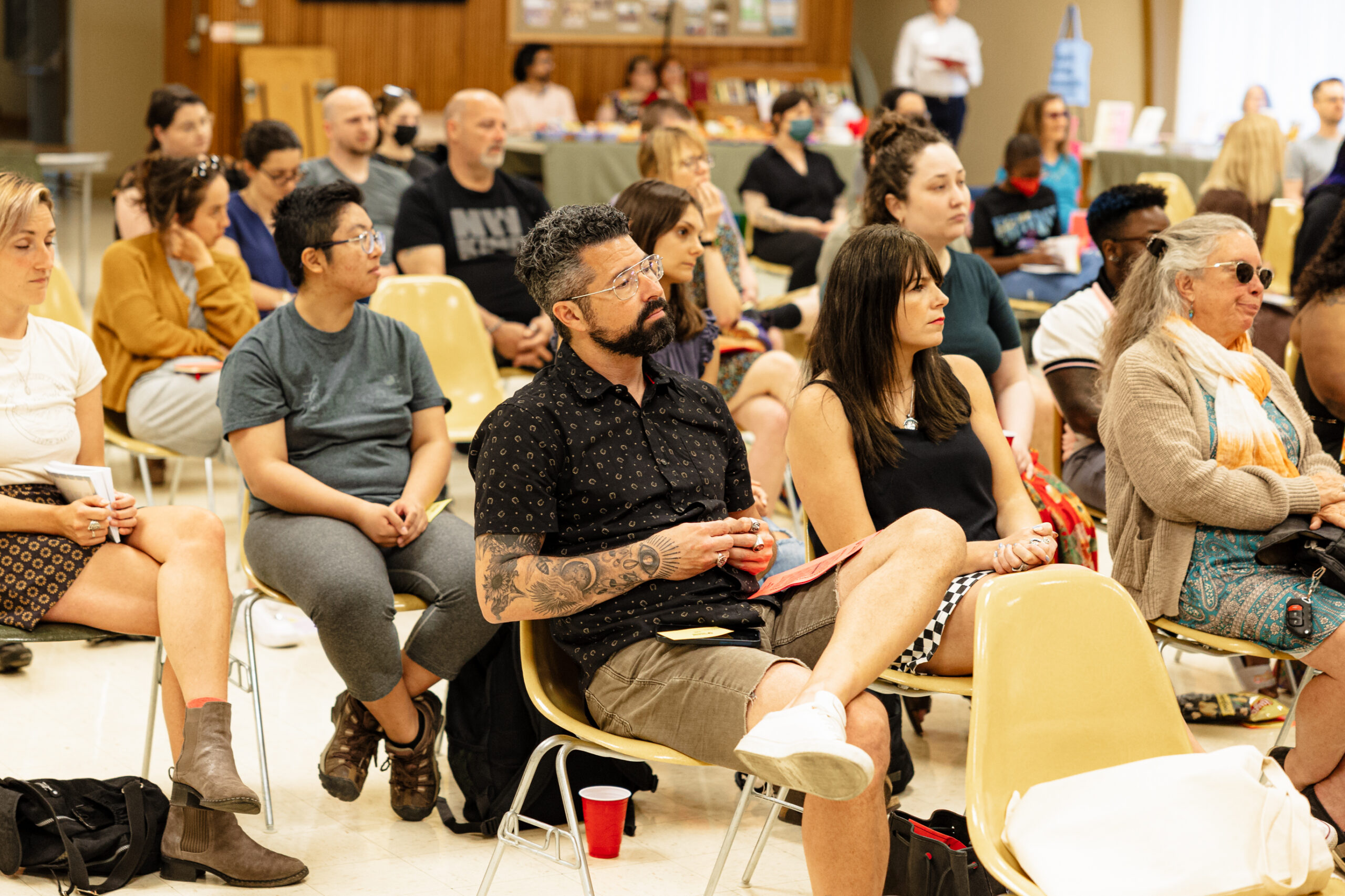
Our Values
Three words define Write Around Portland’s values, guide our programs and sustain our organization: respect, writing, community. Our past is built on their stable foundation. We use them to engage in our present work in vibrant and meaningful ways. We call upon them as we look to the future. These values matter, and they are the heart of our culture.
We name respect first because it is primary, essential and without it, our model of writing and community are not possible. We are a people-centered, relationship-based organization. We believe in the dignity of all people, and we treat everyone with consideration, kindness and a reverence for their individual humanity. We recognize and honor our common humanity.
We are also a writing organization. We believe in words. We facilitate and celebrate the process of writing those words for communication, expression, creativity and connection. We know that everyone has a story and a voice—and that writing is a powerful, transformative tool to develop and share them. We believe that everyone can write, and writing can and should be accessible and inclusive.
Writing can be a solitary act, and in the wider culture it is often thought of as something done in isolation. We believe writing can be particularly powerful when it is done in community, as a shared experience. When people write together, share their writing and encourage one another in the process, they connect, build trust and engender respect.
Our Commitment to Equity
Write Around Portland acknowledges that the way many Americans understand our society and the world is through stories of colonization, imperialism, enslavement, racism, oppression, and capitalism. Our societal understanding of history and our national discourse too often ignores and erases the stories of Black, Indigenous, and People of Color, women, and queer people. In their place, a narrative has been and continues to be carefully constructed to uplift and center those in power through the retelling of specific stories about wealthy white male heterosexual cisgender bodies. Some of these stories are even fabricated.
Additionally, we acknowledge that the literary industry and western literary elites have a long history of intentionally seeking to publish and uplift wealthy white male heterosexual cisgender voices over all other voices. Even today, only certain voices are published, taught, awarded, and marketed widely.
Nonprofits, too, have sometimes fostered an ugly history of colonization and othering using programming that seeks to claim ownership, uproot traditions, erase stories and histories, and create dependence in communities with less privilege and fewer resources.
We acknowledge that Write Around Portland is a product of this history and of our current system. As an organization, we reject these histories while also acknowledging that we may unintentionally uphold systems and practices that continue to oppress.
While we acknowledge the imperfect nature of our practices, what drives us toward equity work is our belief that stories have the power to transform and change lives, communities, and societies. To truly understand one’s own history, community, and impact on others, we believe that everyone needs to encounter stories that are different from their own. Stories from a broad range of perspectives and experiences lead to stronger, safer, more peaceful communities, and they make us better creative writers, nonprofit workers, and humans.
In this way, equity is integral to our mission and in the delivery of our programming. Our work is people-centered and relationship-based, and we believe in the dignity of all people. Interrupting discriminatory behavior and upholding equity are acts that center our common humanity.
Our core values are respect, writing, and community. We know that without respect for others, we cannot have strong communities. In writing workshop spaces, a lack of trust and community diminishes opportunities for vulnerability and the deep, transformative connection that can come from writing and sharing important stories and ideas. Without respect in workshop spaces and in our organizational practices, we cannot foster the change and transformation we seek.
Similarly, because we are a writing organization, we believe in the power of writing as a transformative tool individually and collectively. We celebrate the process of writing for communication, expression, creativity, connection, recovery, relief, and joy. We firmly believe that everyone can be a writer, and that writing can and should be accessible and inclusive. Therefore, we direct most of program delivery toward communities that are underheard in the literary mainstream – people who are unhoused, low-income, incarcerated, in recovery, and/or who have mental or physical illnesses or disabilities. We try to center Black, Indigenous, and People of Color in all of our work.
As a nonprofit organization, Write Around Portland’s programming goes to places where people already live, work, attend school, and/or receive services, making access more possible for those with the least power and resources. We enter as guests and co-create spaces within existing communities, centering the needs and experiences of those we will write with. We don’t claim to give people a voice – rather, we help people find and share their voices. We intentionally seek to share power and find ways to move in and out of communities without intentionally causing harm.
Our programs do not teach – rather, we help people recognize what they already know about writing and storytelling. We ensure people have agency over their own stories and their writing process. As we close our writing groups, we support participants in building their own writing communities rather than needing to return to our organization for additional programming.
Equity remains an essential pillar of our strength as an organization. We acknowledge that we will necessarily fail as we try to build an equitable organization. However, we believe sincerely that our programs and values necessitate striving toward an equitable future for all.
